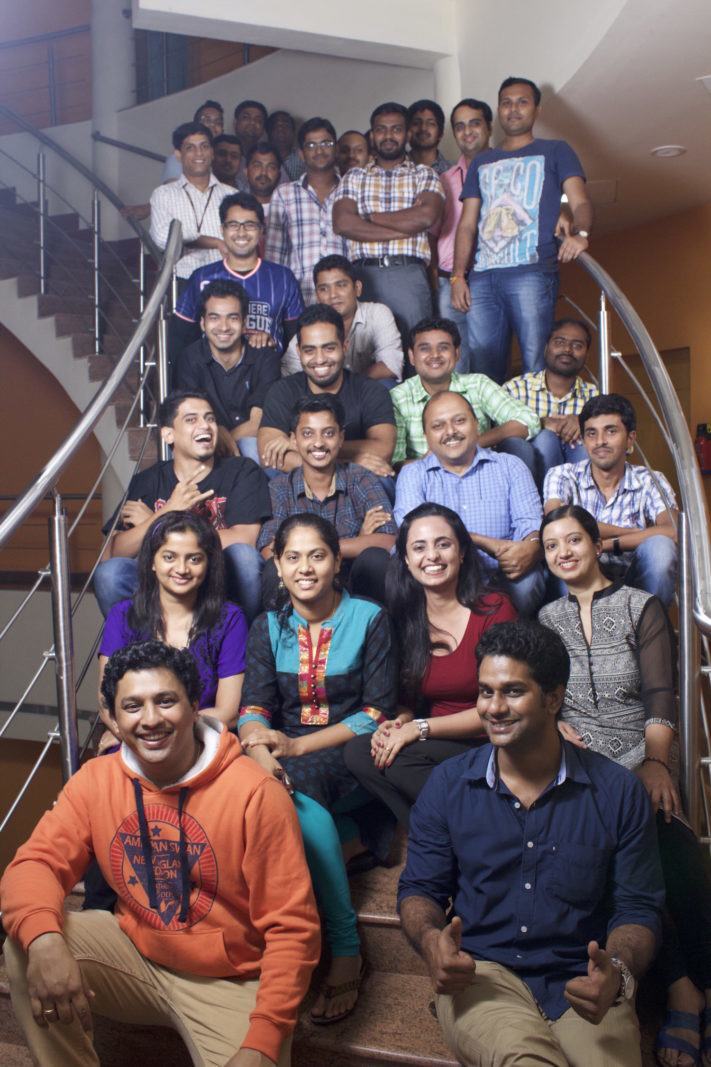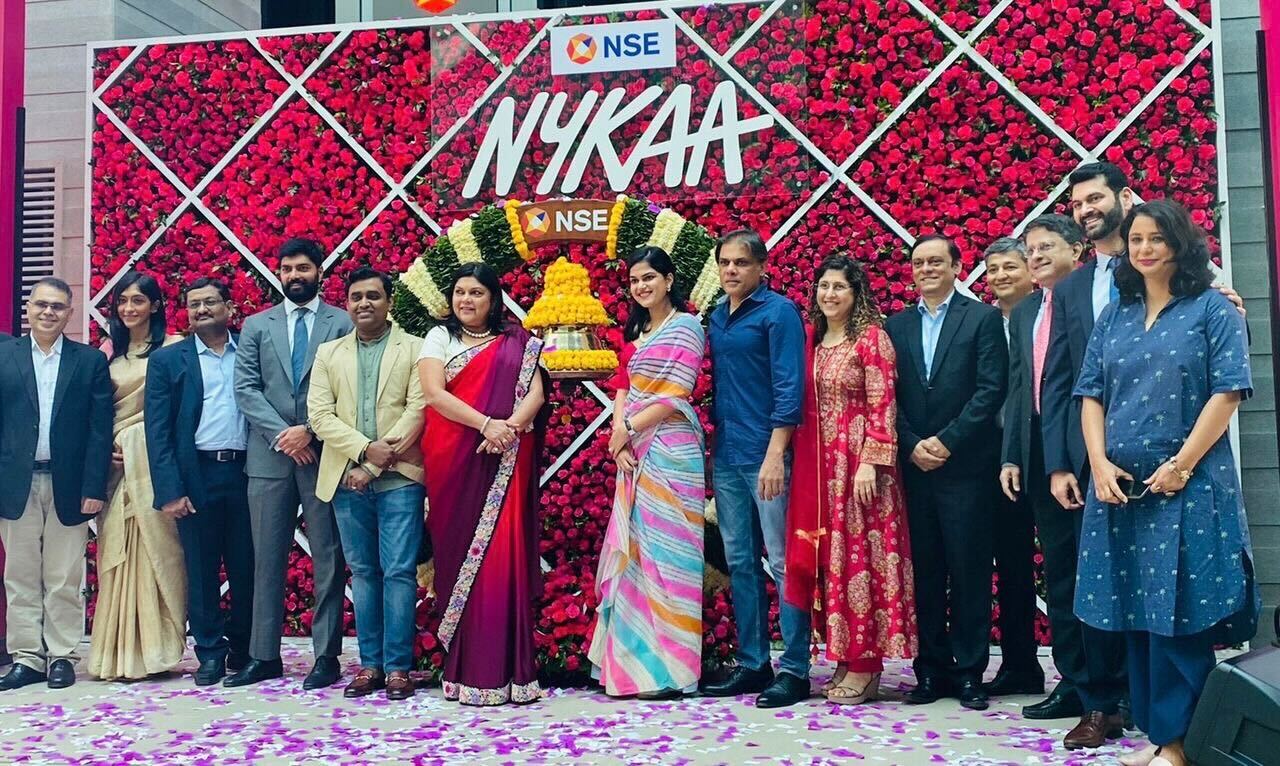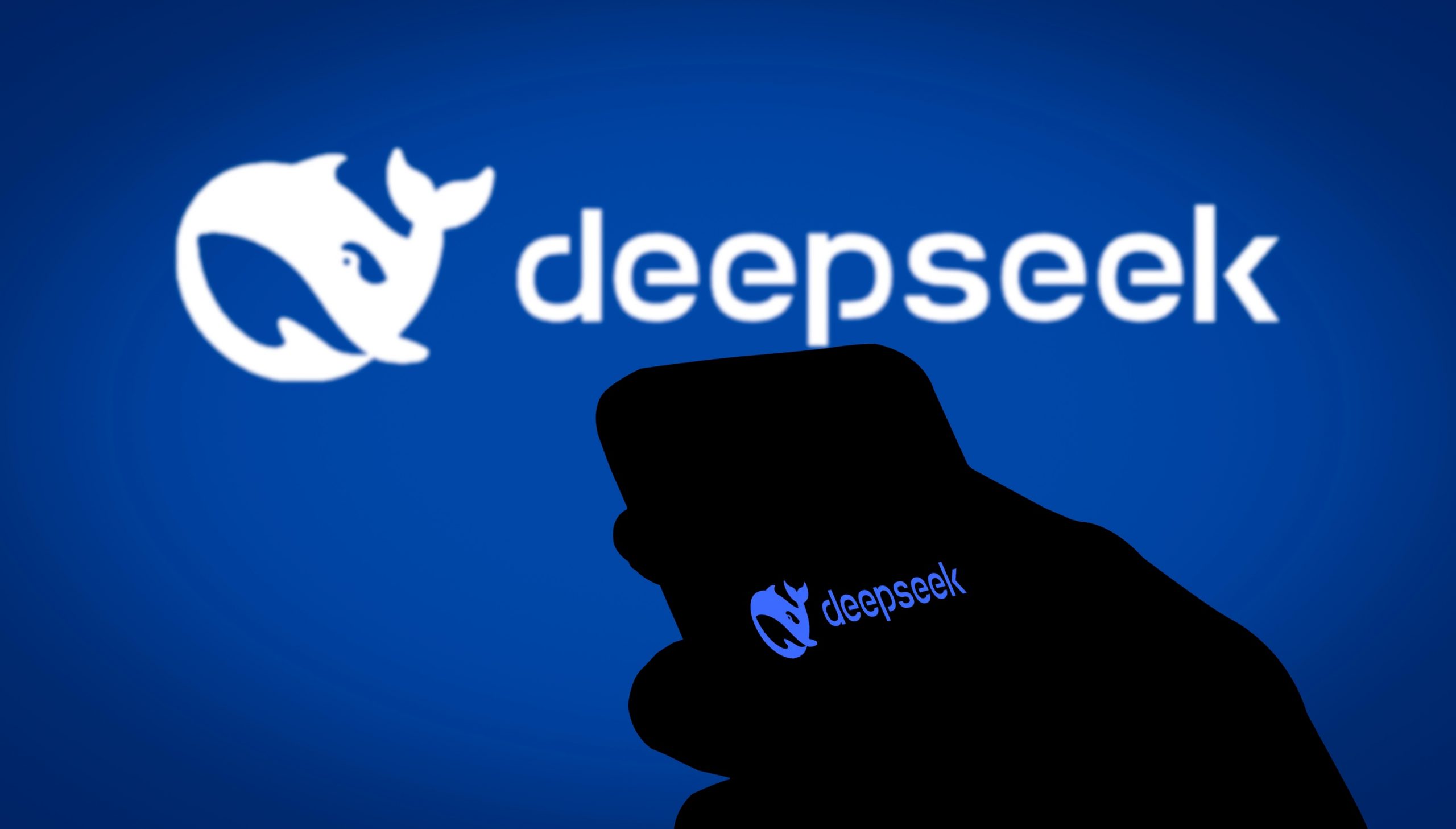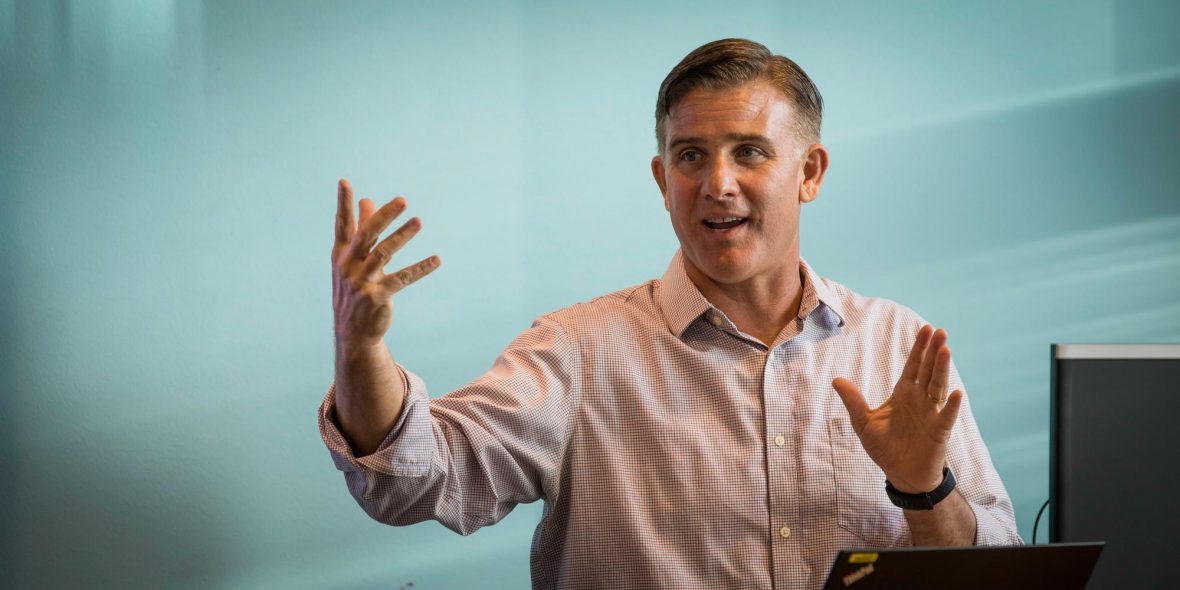In a small town in India, this startup has made millions

Udupi, India. Photo credit: Wikimedia.
In Udupi, where the biggest attraction is a temple and the nearest airport is over an hour’s drive away, Robosoft’s massive, circular tower is the tallest building for miles. Its founder, Rohith Bhat, is also a bit of an anomaly. He’s not your typical small town guy trying to escape the confines of a static environment – in fact, he’s married and settled down there, with a daughter and 450 employees milling around a few miles away from his home.
When investors (and there are plenty interested in Rohith’s app development company) ask him about his choice of location, he responds with a question: “Didn’t Sony start in a small Japanese village?”
I met him at his office where he showed me the latest version of Boom, an app that enhances phone audio. Now, it can turn regular noise into 3D surround sound. He plugs a pair of headphones into the jack, turns on an Evanescence song, and toggles a button on the Boom app.
“This is where we think music is going next,” he mouths to me over the music. “We hide all the hard work, keep it simple, and just give people that one switch to transform their music.”
Simplicity seems to be 20-year-old Robosoft’s motto. The company’s done it all, from helping other firms adjust to Apple’s software demands in 2000 to getting hundreds of apps onto app stores, and even developing an app specifically for zoom and flash when consumers complained that those features weren’t available on the original iPhone.
“We’re a software company that does pure magic,” Rohith states simply.
Go-to guys

Rohith Bhat, founder of Robosoft
The pain point is the central nerve that powers the ever-changing tech world – there’s always something better or newer a customer wants that a service can’t fully offer.
Rohith started out on one end of that nerve in 1996, when Apple officially decided to launch its products in India. It had hired 16 different marketing people to sell its technology – but not a single technical person. Rohith had been working with its software in Japan for a few years, so his return to India placed him among the experts in the country.
“I solved that problem for them by touring around India with their team here,” Rohith says. Robosoft’s first official product was an Indian language keyboard it created for Apple. “Their initial strategy was to have a Hindi and a Gujurati keyboard,” he reminisces. “We rolled one out for them.”
For whatever reason – maybe the keyboard strategy – Apple decided to leave the country within the year. “Steve Jobs said ‘we need to consolidate, let’s win in smaller markets’, and that’s what they did,” says Rohith. For most, this signaled the end of Apple’s time in Asia and companies shut down their internal Apple development teams – but Rohith had a feeling that it wasn’t the end.
“We waited for a while, and were just working with people in Singapore and other places where they had a few customers, and all of a sudden Apple released its new OS,” he says. “Every hardware company thought Apple would have been dead by that point, so they’d all shut down their internal Mac development teams. As Apple pressured them to support its new system, it started referring them to us.”
From Canon in Tokyo to parts manufacturers in Taiwan, Robosoft’s list of clients was endless. “We built software for device drivers, printers, scanners, digital cameras,” Rohith reminisces.
And it wasn’t very different when Microsoft decided to update its operating system. “They were scrapping Windows 95 and 98,” Rohith says. “They became Windows 2000, and the same thing happened all over again – people had to rewrite their device drivers and they’d had a great experience using us for Mac. So, we got into Windows.”
Robosoft was fast becoming ubiquitous.
It got into games. “Game developers weren’t creating for Apple, and they realized it’d be hard to grow their system without them,” says Rohith. “In 2008 or 2009, if you went to a retail shop and flipped the jacket of any game, you’d see the Robosoft logo on more than half the titles.”
It worked with different drivers. “At one point, every HP device had software built by us on its system. Every second printer in the world had our software.”
And yet, it remained B2B, which meant that they were supplying their technology to other businesses, and never gaining notoriety among mainstream consumers. Something was fast approaching though, a moment of reckoning that would let millions of businesses define their own personalities and change the world with simple, lightweight technologies – the epoch of apps.
Focus on yourself
Steve Jobs had a big plan to officially unveil Apple’s app store, and only a select few knew about it – including those at Robosoft. Three months before it launched, the company gave Robosoft its software development kit (SDK). When Steve unveiled the store on stage, five of the 100 apps available were built by Robosoft.
Of course, customers continued to reach out to good old Robosoft for help – and when Android launched its app store, those old clients gave it permission to handle their development.
And yet, something was different. This time around, Robosoft knew that it wanted to do something on its own. ”We won everyone a bunch of awards but not ourselves,” says Rohith. “We figured it was time to focus on ourselves.”
When Robosoft received its series B funding of US$12 million from Kalaari Capital and Ascent Capital last year – bringing its total funding to a neat US$15.7 million – it decided to spin off its app development desires into two companies.

The 99Games team.
It created 99Games for gaming apps and Global Delight for photo, video, and audio apps. Robosoft continued to make apps for other companies, including an app for news site NDTV, fashion site Jabong, and restaurant company Dave & Buster’s. “We had fun, entertainment apps and we had utility apps, and their DNAs were very different,” says Rohith. “We did it for simplicity.”
Global Delight releases a single product each year. So far, it’s launched apps like CameraPlus, which was originally an answer to the lack of flash and zoom on Apple’s first iPhone camera. It has gotten over 28 million downloads and just this week was featured as Apple’s App of the Week across 146 countries.
“We keep updating Camera Plus with five things each new Apple camera isn’t doing,” says Rohith.
It also has apps like GameYourVideo, which allows users to edit videos on their phones. “We think what happened in the camera space where people dumped their analog cameras and got onto the phone is about to happen to the video space,” he says.
Boom is another release from Global Delight. “If you’re at Starbucks and want to interview someone on Skype, you can enhance the audio without any hardware,” he says. “It takes the flat file that you have downloaded from the internet and applies logic to make it look like surround sound. There’s lots of uses for it.”
Boom won the Macworld Best of Show Award in 2011, and GameYourVideo took the award the next year.
Then, there’s 99Games. He introduces me to Anila Andrade, a producer there. “That’s why you see so many women-centric games here,” he laughs.
The first game the company created was a chess app, which was priced at US$2.99. Then, it created WordsWorth, which gets users to unscramble letters to create words. “We were #30 in the app store for Apple and #1 in UK,” says Rohith. “In the US, it topped the chart in 90 days and became the number two game. That’s one of our biggest money makers.”
It’s also built a game around the Indian movie Dhoom that’s gotten it more than 20 million downloads. “That’s the power of Bollywood,” he laughs.
99games’s major release is Star Chef, a game that lets users create virtual restaurant empires by cooking their way to the top. It crossed ten million downloads yesterday.
“In Star Chef, people spend 42 minutes in a game every single day,” he says. “Compare that to Master Chef, that people watch for 40 minutes every week. Someday we’ll have as many people playing this game as watching that show, and that’s an idea that excites and inspires us.”
Family man

Udupi has some lovely beaches. Photo credit: Prasanth MJ.
Udupi is an easygoing city that thrives on an air of wellbeing, so it’s understandable why Rohith hasn’t left.
“When we first started raising funding, people looked at the city of Udupi and cracked jokes,” Rohith says. “I think geography is irrelevant in this day and age.”
Convincing talent to move to the city doesn’t seem to be a challenge either – it’s packed four floors full of its employees. “We had to build this fancy building because all of Bangalore is sitting in big glass buildings,” he laughs. “So we decided to build it on a highway. I don’t want to hear anyone ever talking about it again.”
Rohith’s toughest challenge now is his ten-year-old daughter. “I’m one of those parents that just thrusts chat apps and social network apps at her,” he says. “I’m fascinated to see what she’s interested in.” None of those, apparently – she’s part of that rare demographic that’s teaching herself to knit by watching YouTube videos. Still, she’s curious about what games her dad will release next.
“She’s my best resource,” Rohith says. “If someone wants to create something, they should just look at a problem that the people they know are facing and see if they can come up with a simple solution.”
Robosoft Technologies
Robosoft helps business plan, design & build mobile solutions. We work with globally acclaimed brands and our portfolio has over 1400 apps.
- Location
- India
- Founded
- 1996
- Employees
- 501 – 1,000
- Website
- robosoftin.com
- Latest Funding
- US$12M / Series B
- Hiring
- 0 positions
Recommended reads
 Nykaa’s financial health in 5 charts
Nykaa’s financial health in 5 charts Chips don’t lie: Did China’s latest AI just beat the US?
Chips don’t lie: Did China’s latest AI just beat the US? These funds have not invested in India in the past year
These funds have not invested in India in the past year Microsoft eyes $10b injection into ChatGPT maker
Microsoft eyes $10b injection into ChatGPT maker Get near-instant insights on Tech in Asia with Go Deeper Q&As
Get near-instant insights on Tech in Asia with Go Deeper Q&As Subscribers only: an evening with the man who coined ‘growth hacking’
Subscribers only: an evening with the man who coined ‘growth hacking’ OpenAI founding scientist Ilya Sutskever is leaving the firm
OpenAI founding scientist Ilya Sutskever is leaving the firm List of SEA, India exec moves: Changes at X, Amazon, Razer
List of SEA, India exec moves: Changes at X, Amazon, Razer 50 rising AI startups in Asia
50 rising AI startups in Asia Meta launches first models of its latest Llama 3 LLM
Meta launches first models of its latest Llama 3 LLM
Editing by C. Custer and Kylee McIntyre
(And yes, we’re serious about ethics and transparency. More information here.)









